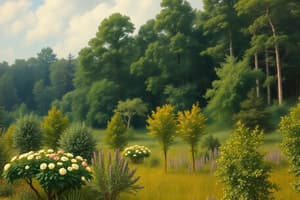Podcast
Questions and Answers
Ecological succession in new areas of land with little to no soil or vegetation is called ______ Succession.
Ecological succession in new areas of land with little to no soil or vegetation is called ______ Succession.
Primary
The final stage of ecological succession is called the ______ community.
The final stage of ecological succession is called the ______ community.
climax
The process by which freshwater ecosystems change over time in a natural and predictable way is called ______ succession.
The process by which freshwater ecosystems change over time in a natural and predictable way is called ______ succession.
aquatic
Too much ______ can lead to flooding, habitat loss, change in available nutrients, and coastline alteration.
Too much ______ can lead to flooding, habitat loss, change in available nutrients, and coastline alteration.
The process of a body of water becoming nutrient rich is called ______.
The process of a body of water becoming nutrient rich is called ______.
Ecosystems operate under ______ equilibrium, which describes the balance between different parts of the ecosystem.
Ecosystems operate under ______ equilibrium, which describes the balance between different parts of the ecosystem.
Human activity such as resource extraction can cause ______ loss and disrupt forest ecosystems.
Human activity such as resource extraction can cause ______ loss and disrupt forest ecosystems.
The introduction of ______ species can cause competition and overcrowding, forcing species out of their natural habitats or causing them to die out.
The introduction of ______ species can cause competition and overcrowding, forcing species out of their natural habitats or causing them to die out.
Match the following types of succession with their descriptions:
Match the following types of succession with their descriptions:
Match the following terms with their definitions:
Match the following terms with their definitions:
Match the following human activities with their effects on ecosystems:
Match the following human activities with their effects on ecosystems:
Match the following ecosystem changes with their effects:
Match the following ecosystem changes with their effects:
Match the following ecosystem disruptions with their causes:
Match the following ecosystem disruptions with their causes:
Match the following ecosystem changes with their effects on populations:
Match the following ecosystem changes with their effects on populations:
Match the following ecosystem components with their descriptions:
Match the following ecosystem components with their descriptions:
Match the following ecosystem disturbances with their effects:
Match the following ecosystem disturbances with their effects:
Flashcards are hidden until you start studying
Study Notes
Ecosystem Changes
- Ecological succession is the process of one ecological community gradually changing into another.
- The final stage of ecological succession is called climax community, a stable community that no longer goes through major changes.
Types of Succession
- Primary Succession: ecological succession in new areas of land with little to no soil or vegetation.
- Secondary Succession: occurs in areas where existing ecosystems have been disturbed or destroyed, such as land cleared for crops.
Aquatic Ecosystem Changes
- Aquatic succession is the process by which freshwater ecosystems change over time in a natural and predictable way.
- Sediment is any material broken down by weathering and transported by wind, water, or gravity.
- Excessive sedimentation can lead to:
- Flooding
- Habitat Loss
- Change in available nutrients
- Coastline alteration
Eutrophication
- Eutrophication is the process of a body of water becoming nutrient rich.
- Causes of eutrophication include:
- Runoff from fertilizers
- Decaying organisms
- Eutrophication leads to:
- High nutrient levels
- Algae and microorganisms growth
- Decreased dissolved oxygen levels
Impact on Populations
- Ecosystems operate under dynamic equilibrium, describing the balance between different parts of the ecosystem.
- Natural disruptions include:
- Forest fires
- Floods
- Volcanic eruptions
- Disease
Human Impact on Ecosystems
- Resource Extraction:
- Habitat loss and deforestation disrupt forest ecosystems.
- Drilling for oil devastates aquatic environments.
- Pollution:
- Contaminants are expelled into the environment through human activity.
- Examples: air pollution and water pollution.
- Nonnative Species:
- Competition and overcrowding force species out of their natural habitats or cause them to die out.
Ecological Succession
- Ecological succession is the gradual change of one ecological community into another
- The final stage of ecological succession is called the climax community, a stable community that no longer undergoes major changes
Types of Ecological Succession
- Primary Succession: occurs in new areas of land with little to no soil or vegetation
- Secondary Succession: occurs in areas where existing ecosystems have been disturbed or destroyed, such as land cleared for crops
Aquatic Succession
- Aquatic succession is the natural and predictable change of freshwater ecosystems over time
- Sedimentation can lead to flooding, habitat loss, changes in available nutrients, and coastline alteration
- Eutrophication is the process of a body of water becoming nutrient-rich, caused by runoff from fertilizers and decaying organisms
- Human activity contributes negatively to eutrophication, leading to high nutrient levels, algae growth, and decreased dissolved oxygen levels
Dynamic Equilibrium and Ecosystem Disruptions
- Ecosystems operate under dynamic equilibrium, a balance between different parts of the ecosystem
- Natural disruptions include forest fires, floods, volcanic eruptions, and disease
- Human activities such as resource extraction, pollution, and non-native species can disrupt ecosystems
Human Impact on Ecosystems
- Resource extraction can lead to habitat loss and deforestation, disrupting forest ecosystems
- Drilling for oil can devastate aquatic environments
- Pollution through human activity can contaminate the environment, causing air and water pollution
- Non-native species can cause competition and overcrowding, forcing species out of their natural habitats or leading to their extinction
Studying That Suits You
Use AI to generate personalized quizzes and flashcards to suit your learning preferences.




